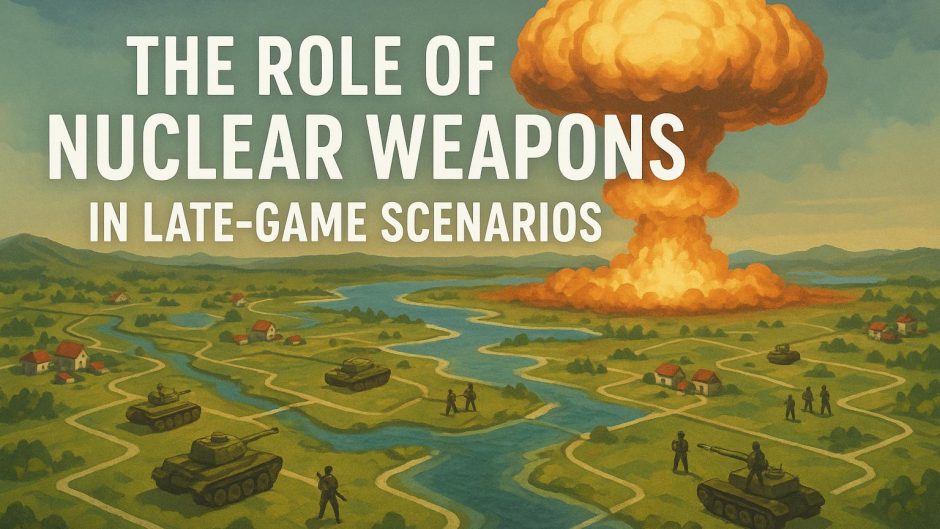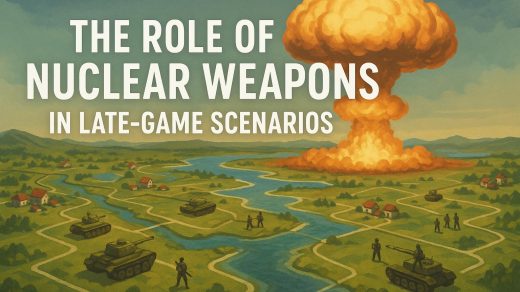The Strategic Role of Nuclear Weapons in Late-Game Scenarios
In discussions about global security and military strategy, the role of nuclear weapons often comes under intense scrutiny. These weapons serve as a crucial factor in late-game scenarios where geopolitical tensions have reached a climax. It is essential to understand their influence from multiple dimensions such as deterrence, strategic balance, and the potential consequences of their use.
Deterrence and Power Projection
The primary reason nations maintain nuclear arsenals is deterrence. This concept hinges on the theory that the possession of nuclear weapons prevents adversaries from taking aggressive actions due to the fear of overwhelming retaliatory strikes. This deterrence is crucial in late-game scenarios when tensions are high. Nations understand that nuclear weapons create a kind of stalemate where neither side can emerge victorious without incurring massive costs. Many countries maintain their nuclear capabilities not to launch attacks but to prevent them. Through deterrence, they work to maintain peace or prevent the escalation of conflicts that have the potential to spiral out of control.
Deterrence works not only to prevent large-scale armed conflicts but also to stabilize power dynamics between nuclear-armed states. The credibility of a nation’s deterrent is also a function of its capability to promptly and effectively respond to any form of aggression. Advanced delivery systems, a reliable command and control network, and visible proof of capability can contribute to a nation’s deterrent posture. While the horrors of nuclear conflict rationally deter, it also raises the stakes of any confrontation, urging caution and restraint amongst nuclear-armed states. For countries without nuclear weapons, forming alliances with nuclear-capable states can act as an alternative form of deterrence, often under the protective umbrella of a superpower such as the United States.
Strategic Balance and Mutually Assured Destruction
A critical element in understanding the role of nuclear weapons is the concept of Mutually Assured Destruction (MAD). This doctrine posits that when two or more sides possess considerable nuclear capabilities, the prospect of complete annihilation prevents any form of escalation, thus maintaining a strategic balance. During late-game scenarios, this principle ensures that no rational actor would consider initiating a conflict that could lead to mutual devastation.
The strategic balance created by MAD has long informed international policies and diplomatic relations, providing a grim but effective check against the outbreak of large-scale wars. For instance, during the Cold War, the idea of MAD essentially prevented direct military conflict between the United States and the Soviet Union, as both sides recognized the inevitability of mutual destruction. The belief that no one can ‘win’ a nuclear war, as articulated by several international figures, ensures a kind of peace, albeit a fragile and uneasy one.
For more detailed insights on this subject, consider reading resources from established defense think tanks or research institutions that focus on international security. Such organizations provide comprehensive analysis and historical context for the concept of MAD and its implications for global stability.
Crisis Stability and Escalation Control
Nuclear weapons also play a role in crisis stability. In high-stakes posturing, where conventional means of conflict have been exhausted or are deemed ineffective, nuclear arsenals become tools for strategic signaling. They function as powerful symbols to exert pressure on adversaries to de-escalate their actions. Through actions such as mobilizing nuclear forces or conducting missile tests, nations signal their willingness to escalate, thereby coercing adversaries into diplomatic negotiations or retreats.
However, this delicate balancing act can be fraught with risks. The presence of nuclear weapons in conflict scenarios can sometimes exacerbate tensions rather than alleviate them. The risk includes potential misjudgments or miscommunications, which could inadvertently heighten tensions and lead to unintended escalations. The complex systems often required for managing nuclear arsenals introduce further risks of accidental launches or unauthorized use, particularly in times of crisis.
Achieving crisis stability requires not only restraint but also the presence of effective communication channels between conflicting parties. Mechanisms like hotlines, diplomatic backchannels, and strategic dialogues are crucial. Confidence-building measures and treaties that limit certain categories of weapons or establish non-aggression pacts can also play important roles in controlling escalation.
The Risks and Ethical Considerations
While nuclear weapons may serve as stabilizers in late-game scenarios, their existence poses significant risks. The notion of using these weapons raises profound ethical and humanitarian questions. Nuclear weapons have the capability to cause destruction on an unparalleled scale, leading to massive loss of life and environmental devastation. The catastrophic consequences of nuclear war, regardless of the scenarios considered, have historically been documented by various international organizations and NGOs dedicated to disarmament and peace.
Moreover, the moral implications of targeting civilian populations with nuclear weapons are deeply troubling. The potential for widespread human suffering cannot be justified by the strategic calculations that drive nuclear deterrence policies. These ethical complexities demand constant vigilance and commitment to arms control initiatives and non-proliferation efforts around the world.
Efforts towards disarmament and the promotion of international treaties such as the Treaty on the Non-Proliferation of Nuclear Weapons (NPT) reflect the global desire to reduce the risks associated with nuclear arsenals. Advocacy for these issues continues to be crucial for ensuring a safer, more secure world.
Conclusion
Nuclear weapons undeniably play a complex and multifaceted role in late-game scenarios. They act as deterrents, maintain strategic balance, and function as tools for crisis management. Yet, the underlying threats and moral discussions they provoke require continuous dialogue. Understanding these dimensions is vital for policymakers, academics, and the general public as they navigate an intricately connected world.
In navigating these challenging considerations, continued international cooperation, dialogue, and negotiation are paramount. The evolving nature of global politics necessitates that these conversations persist alongside efforts to address the ethical quandaries posed by nuclear weapons. For further exploration, reliable sources and expert analyses are available through dedicated platforms that specialize in geopolitical and defense studies.
This article was last updated on: October 9, 2025






Recent Comments